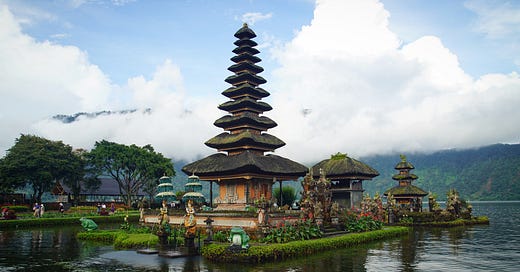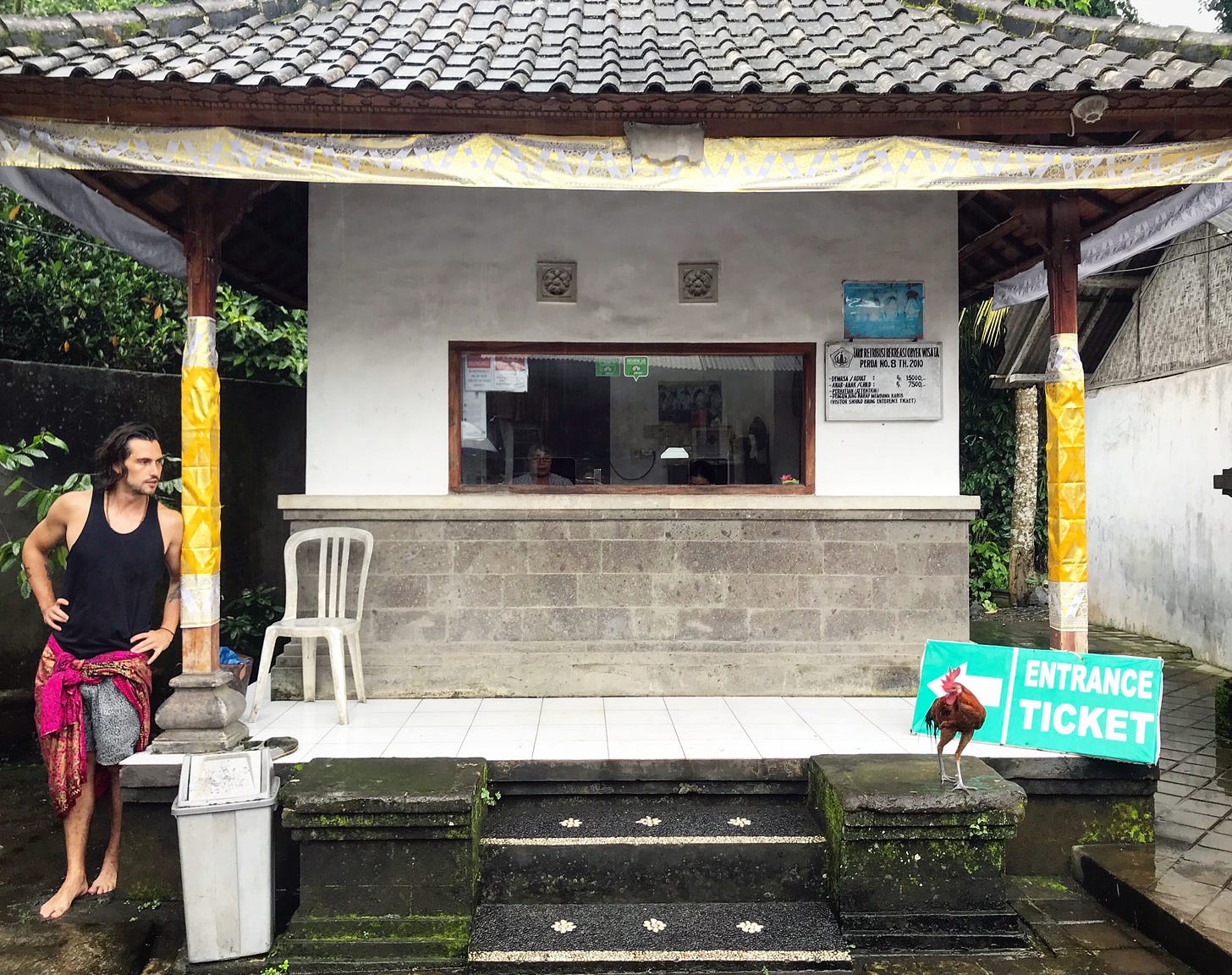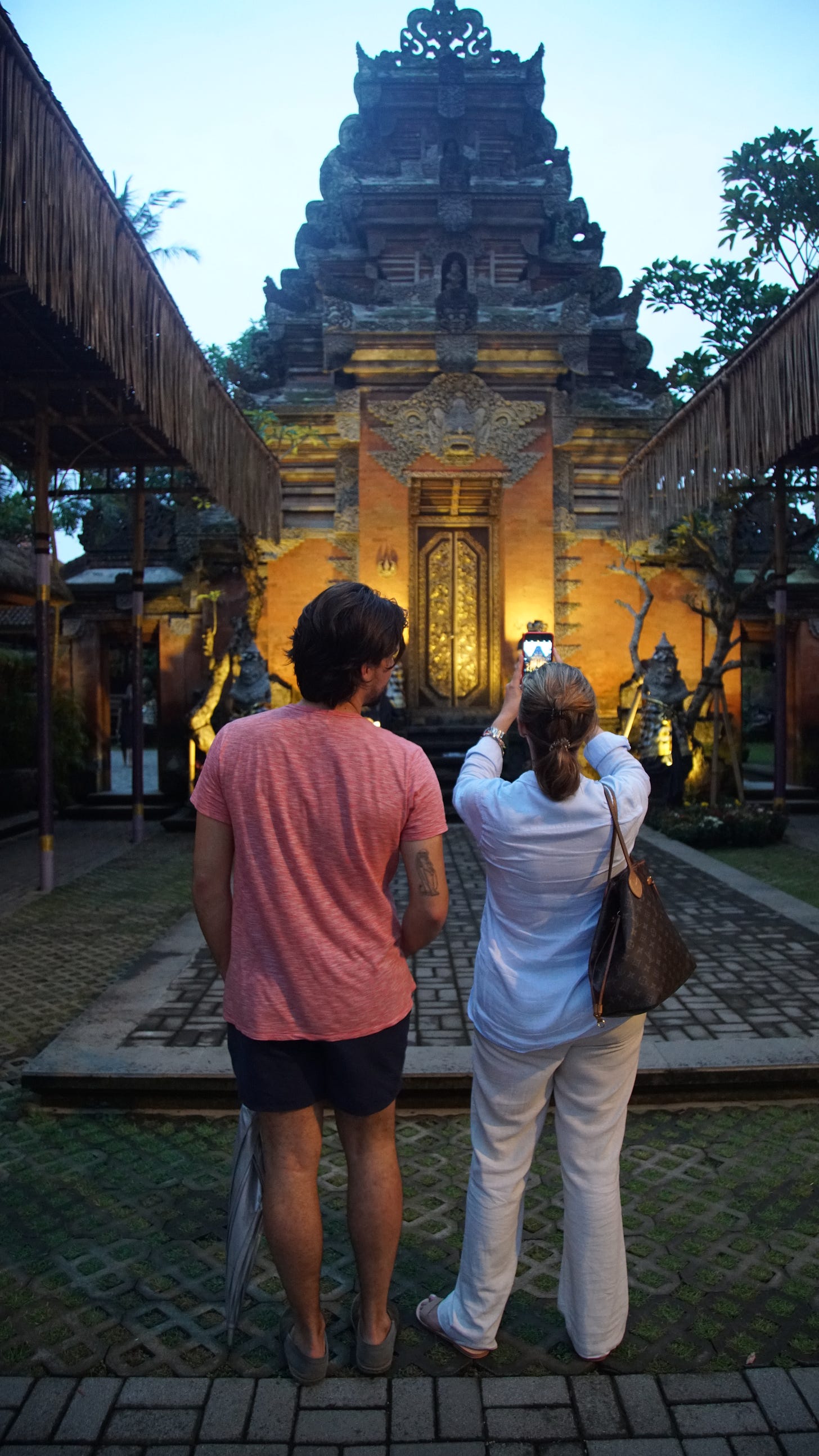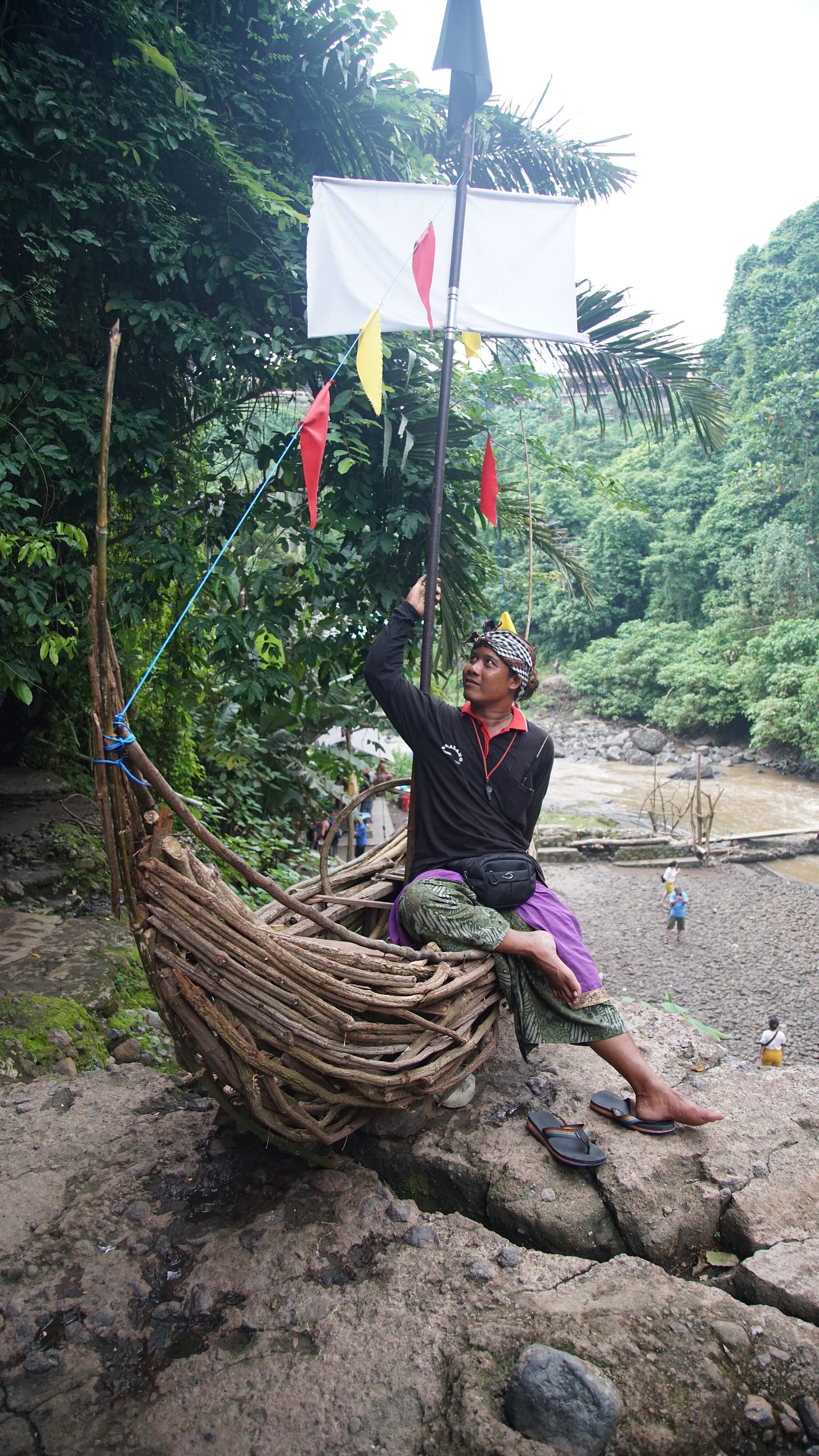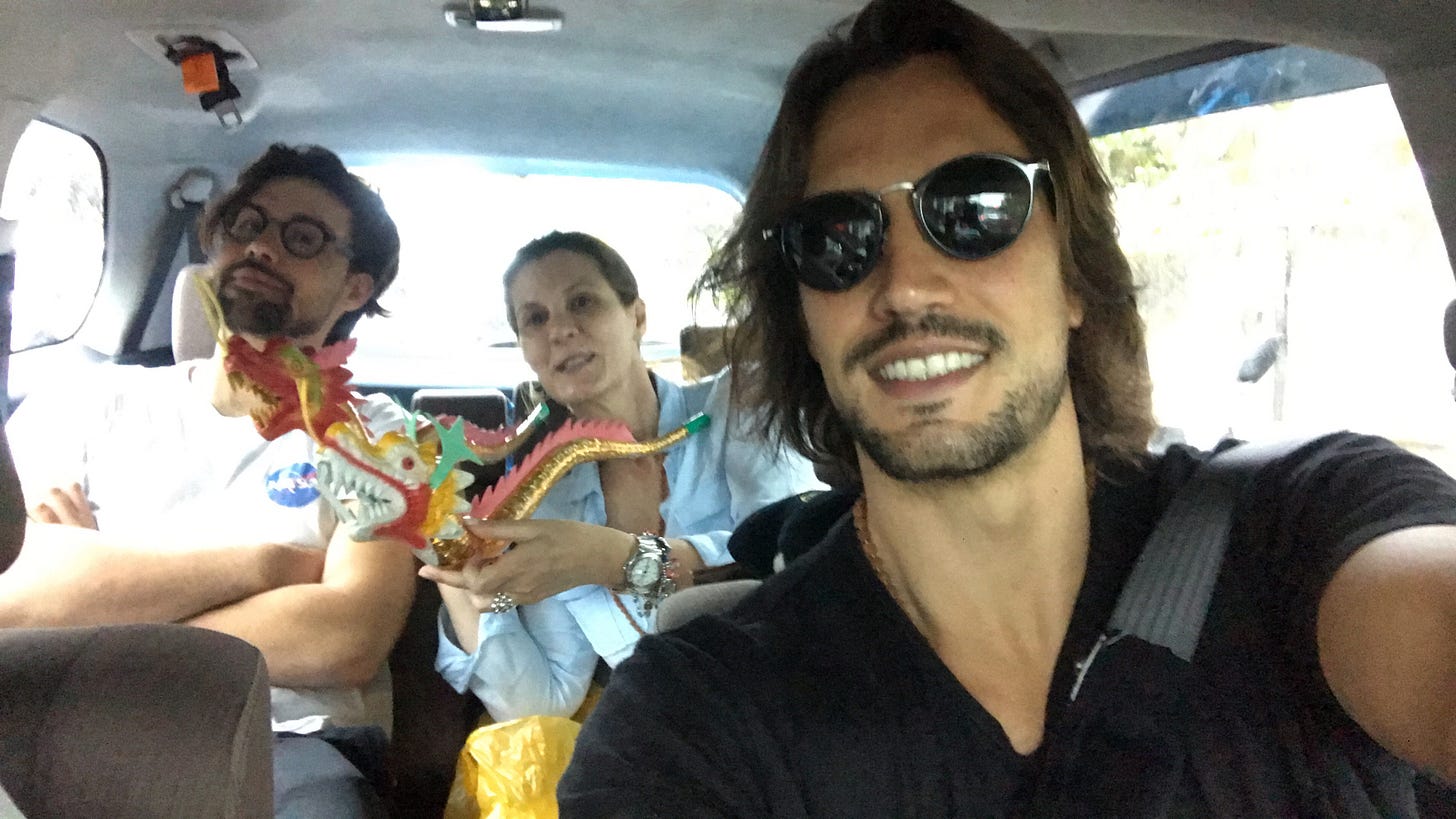From Babylon to Bali: Part II of II / De Babilonia a Bali: Parte II de II
Nothing lasts forever in this world. Nada es eterno en el mundo.
Para leer la versión en español, desliza hasta abajo
This is the second part of the series; to read the first part, click here.
According to Rastafarian philosophy, Babylon represents a world that has lost its essence. It is an invisible structure that upholds the power of a privileged few, suppressing love within a hierarchy based on inequality and injustice. This oppressive mindset drags us into the depths of materialism and consumerism, causing us to forget our spirituality in pursuit of fleeting wealth and leaving scars on our planet with every selfish decision.
After spending a month in Bali, I was on a natural high. Each day felt like an experience with MDMA or LSD, filled with unconditional love, serenity, and fulfillment. The world around me no longer appeared three-dimensional; it was as if I was observing a complex painting, a canvas that spun and vibrated with nurturing energy. My senses were heightened, allowing me to notice the intricate details of life that had previously eluded me.
In addition to practicing asanas and dedicating long hours to meditation, the Balinese way of life inspired me to deepen my connection with the source, acknowledge my place as part of nature, and trust in the ever-expanding universe where abundance is accessible to all. This was largely influenced by the daily canang sari rituals, which involved offering woven palm leaf baskets filled with flowers, rice, incense, and sometimes even food. These offerings were placed at entrances, altars, shrines, and in nature itself, which is considered sacred.
It was December when my mother and brother agreed to join me in Bali to celebrate the new year. Prior to their arrival, I rented a scooter and ventured through lush landscapes, taking shelter whenever tropical thunderstorms unleashed torrents of fresh rain. I had heard about a tattoo studio that offered traditional hand-tapped designs, a technique commonly practiced in Borneo, another pristine Indonesian island where locals adorned their bodies with permanent marks symbolizing social status and warding off malevolent spirits.
After exploring countless traditional designs and discussing the significance of each with the tattoo artist, we settled on a simple yet profound drawing: a cross with four dots, representing family and the inner journey—the ultimate path to conquer our minds, free our spirits, and distance ourselves from Babylon. The tattooing session turned out to be more ceremonial than expected. It involved the use of sacred fabrics and pillows arranged on a natural mat, where I would lie down as the rhythmic sounds of Bornean gamelan music resonated in the background. Two artists collaborated, stretching my skin and tapping the stick in a rhythmic motion. It felt like a meditation, a way to focus on my breath and transcend the pain.


When my family finally arrived, I realized they were operating on a different frequency, tuned to the rhythm of city life where immediacy and convenience reign supreme. My mother noticed a change in me and worried that I had joined a cult. The long flights and jet lag prevented them from fully experiencing Bali through my eyes. My brother simply longed for rest after enduring over 27 hours of travel. It took them a few days to adjust and understand the reality of a place that had cautiously embraced capitalism without compromising its culture and beliefs.
After exploring the island, visiting iconic temples, savoring delicious fruits and vegan meals, meeting local artisans, and hunting for vintage treasures, their circadian rhythms aligned, and they began to appreciate the various ceremonies, sound healings, and celebrations we witnessed. Daily massages also contributed to their transformation (back then, you could indulge in an hour-long massage for just $10 USD). They had fallen under Bali's spell. Their shoulders relaxed and their smiles became more radiant.
In the pursuit of spiritual enlightenment, no one tells you that happiness is fleeting and that reaching such a state is an endless quest. Reality hits you in the face when you return to Babylon. Although it primarily involves a mental shift that requires reevaluating paradigms and establishing standards that value a slower and more interconnected way of life, once you return to your routine, the illumination begins to fade. Sustaining a sense of calm and fulfillment in a society that incessantly urges you to consume more and compete harder, rather than appreciating what you have and collaborating with others to achieve overall stability, means swimming against the current in a turbulent ocean that has left us jaded.
It has been six years since I last felt that way in Bali. I miss that sensation. While I continue to apply the lessons I learned during that transformative experience, these days I feel constrained by my own mind, burdened by a heavy heart. Perhaps that feeling can only be found in Bali. Maybe I will never experience it again. In our pursuit of spiritual autonomy, we must keep exploring every door that opens along our journey, remembering that one never steps into the same river twice.
Esta es la segunda parte de la serie; para leer la primera parte, haz clic aquí.
Desde la perspectiva filosófica rastafari, Babilonia encarna un mundo que ha perdido su esencia. Es una estructura invisible que defiende el poder de unos pocos, sofocando el amor en una jerarquía basada en la desigualdad y la injusticia, construyendo barreras. Esta mentalidad opresiva nos arrastra hacia el abismo del materialismo y el consumismo, olvidando nuestra espiritualidad en busca de riquezas efímeras y dejando cicatrices en nuestro planeta con cada decisión egoísta.
Había pasado un mes en Bali y me sentía en la cúspide de la vida. Cada día experimentaba una sensación similar a haber tomado MDMA o LSD; el amor incondicional, la serenidad y la plenitud fluían en mi ser. El mundo que me rodeaba ya no parecía tridimensional. Sentía que observaba una pintura compleja, un lienzo que giraba y vibraba con energía nutritiva. Mis sentidos se agudizaron; podía captar detalles de la vida que antes me pasaban desapercibidos.
Además de practicar asanas y meditar largas horas, el estilo de vida balinés me inspiró a estar más conectado con la fuente, a reconocerme como parte de la naturaleza y a confiar en que el universo siempre está en expansión (la abundancia es de todos). Esto se debió en gran parte a la influencia diaria de los canang sari, rituales en los que se hacían ofrendas en cestas tejidas con hojas de palma, llenas de flores, arroz, incienso e incluso alimentos, que se colocaban en entradas, altares, santuarios y en la propia naturaleza, considerada sagrada.
Era diciembre y mi madre y mi hermano habían acordado reunirse conmigo en Bali para celebrar el año nuevo. Antes de su llegada, alquilé una moto y recorrí paisajes exuberantes, haciendo paradas obligatorias cada vez que una tormenta tropical golpeaba la tierra con miles de galones de lluvia fresca. Había oído hablar de un estudio de tatuajes que ofrecía diseños hechos a mano, una antigua técnica común en Borneo, otra isla prístina de Indonesia, donde los lugareños cubrían sus cuerpos con marcas permanentes para simbolizar su estatus social y alejar a los malos espíritus.
Después de examinar cientos de diseños tradicionales y hablar con el tatuador sobre el significado de cada uno, llegamos a un dibujo simple pero cargado de significado: una cruz de cuatro puntos que representaba la familia y el viaje interior, el último camino para conquistar nuestra mente, liberar nuestro espíritu y alejar a Babilonia. La sesión fue más ceremoniosa de lo esperado, involucrando el uso de telas sagradas y almohadas dispuestas sobre una estera natural, donde me recosté mientras los sonidos de la música tradicional de gamelán de Borneo resonaban de fondo. Dos artistas diferentes colaboraron estirando mi piel y dirigiendo el palo de manera rítmica. Se sentía como una meditación, una forma de contemplar mi respiración para superar el dolor.

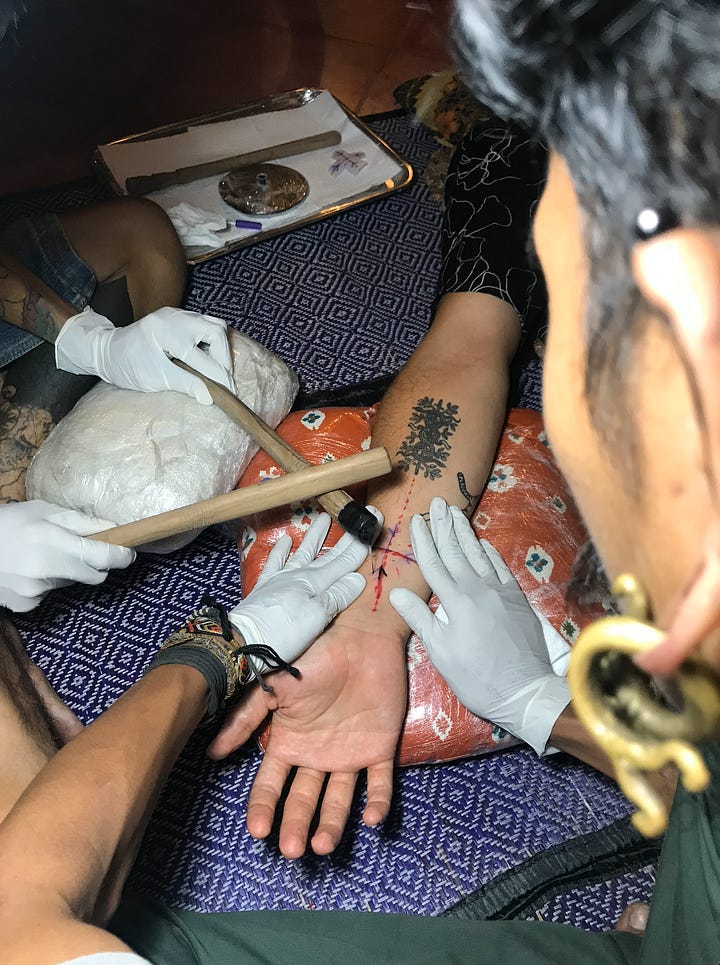
Cuando finalmente llegó mi familia, me di cuenta de que estaban en una frecuencia diferente, vibrando al ritmo de la vida en la ciudad, donde la inmediatez y la comodidad reinaban. Mi madre notó un cambio en mí y se preocupó de que me hubiera unido a una secta. Los largos vuelos y el desfase horario tampoco ayudaron a que vieran Bali a través de mis ojos. Mi hermano solo quería dormir (había pasado más de 27 horas en aviones para llegar). Les llevó algunos días adaptarse y comprender la realidad de un lugar que ha sido cauteloso al abrazar el capitalismo sin sacrificar su cultura y creencias.
Luego de recorrer la isla, visitar templos icónicos, disfrutar de deliciosas frutas y comidas veganas, conocer artesanos y buscar antigüedades, su ritmo circadiano se ajustó y comenzaron a disfrutar de las diversas ceremonias, sanaciones sonoras y celebraciones que presenciamos. Los masajes diarios también ayudaron (en ese momento, el costo era de $10 USD por hora). Bali les había cautivado. Sus hombros dejaron de encogerse y sus sonrisas empezaron a mostrarse.
En el proceso de iluminación espiritual, nadie te dice que la felicidad no es permanente y que llegar a ese estado es una búsqueda sin fin. La realidad te golpea en el rostro cuando regresas a Babilonia. Aunque en su mayoría es un marco mental que debe ser rediseñado para repensar los paradigmas y crear estándares que valoren un estilo de vida más lento y conectado, cuando vuelves a la rutina, la iluminación comienza a desvanecerse. Mantener un alto nivel de calma en una sociedad que siempre te empuja a consumir más y competir más duro, en lugar de agradecer lo que tenemos y colaborar con los demás para lograr estabilidad en todos los aspectos, requiere ir a contracorriente en un océano turbulento que nos ha dejado sin corazón.
Han pasado seis años desde que me sentí así en Bali. Echo de menos esa sensación. Sigo aplicando lo que aprendí durante esa experiencia, pero en estos días me siento más restringido por mi mente y con el corazón pesado. Tal vez solo se puede lograr esa sensación en Bali. Quizás nunca vuelva a experimentarla. En la búsqueda de nuestra autonomía espiritual, debemos seguir explorando cada puerta que se abra en nuestro camino, recordando que nunca se pisa el mismo río dos veces.

